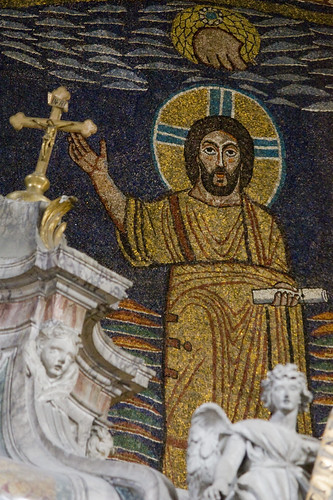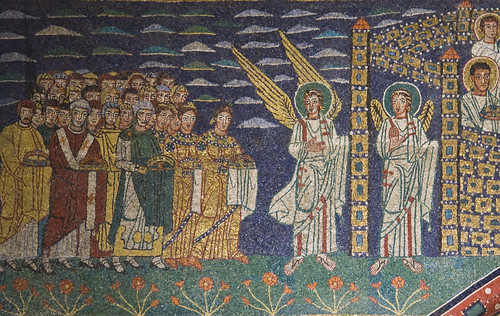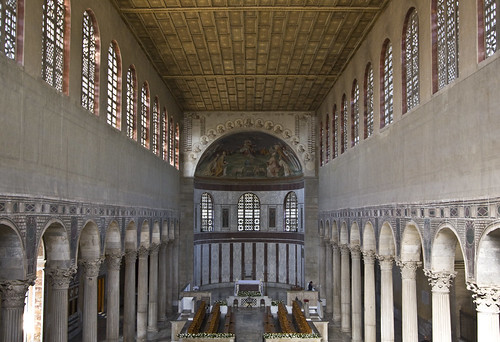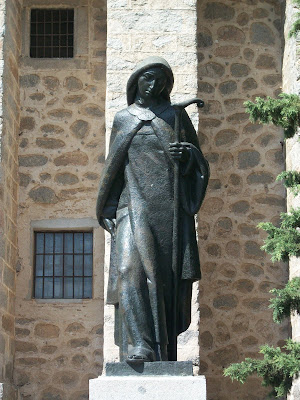A Dominican brother in Rome said to me recently: ‘Christ died for our sins, so make it worth his while!’ At first this looks like an encouragement to sin more - as if I needed any encouragement - but in a sense this is what we celebrate in today’s feast. It’s All Saints, and it is the saints that make Christ’s death worth while. And they make Christ’s death worth while because the stuff from which saints are made is not plaster but flesh-and-blood sinners. For it is from this kind of clay - sinful humanity - that God transforms us by his grace, and shapes us into a thing of beauty. We become a precious vessel that he marks with his seal, and fills with his Spirit, and indeed, fills with his own Body and Blood. But for this to be the case, the clay must know its nature, and be malleable, yet able to withstand the heat of the kiln.
Today’s feast follows on nicely from last Sunday’s readings: for the difference between the publican and the Pharisee is not that one is a sinner, and the other is not. No. Both were sinners, but the publican knew he was clay… He acknowledged his sinfulness, and recognized his distance from God’s holiness, and he longed for God’s mercy, to see God’s face. Such a person, we might say, is “poor in spirit”. And this is the beginning of wisdom, and of blessed-ness, it sets one on the path to sainthood. As a priest said to me once in confession: the path to holiness begins with this first step - the admission of our sins, and of our need for God’s transforming grace. And we see this desire expressed by the saints in our first reading. They cry out: “Salvation belongs to our God”! And those who become saints constantly beg for God’s salvation, they long to see his face, and hope that one day they shall see him as he really is.
The one who is poor in spirit is, in many ways, like a child, and this is another image offered by today’s readings. For we are God’s children, and, I suspect, like all children we make mistakes, and are still learning. We are learning to live well, and to be truly human as Jesus is. We are learning to walk… in Christ’s Way, to speak… the Word planted in our hearts, to feed… on the Sacrament of His Body and Blood. In a sense it is in the nature of a child to be stumbling, learning, and growing, and so when we say that God loves us as his children, we also say, I think, that God loves sinners. And he loves sinners because only the one who knows he is a sinner, who is failing, stumbling, struggling, knows he needs God, and needs his salvation. Such a person relies on God’s mercy and love shown on the Cross. So, as we heard in the first reading: “they have washed their robes and made them white in the blood of the Lamb” because it is Christ’s death and resurrection that wins us salvation; his blood, which we receive in this Eucharist, that is poured out for us, and frees us from the “great tribulation” of sin and death.
So, in a sense, we should rejoice that we are sinners! For don’t we hear every Easter night: “O happy fault, O necessary sin of Adam that won for us so great a Redeemer!” Now, some theologians argue that Christ came to perfect creation, to be its crown and completion, and that he would have become Man even if Adam had never sinned. Yes, of course, Jesus Christ is the perfection of creation, but as St Thomas Aquinas saw so clearly, Christ became Man for our salvation. And for that to be the case, he needs sinners to make it worth his while! But he not only needs sinners, but he needs sinners who know their need of salvation, not sinners who think they’re saints. After all, Christ is no more a Saviour than when we are sinners!
 For Christ became Man, and united himself with sinful humanity, so that we might become God. And he does this by the gift of His grace which makes us beautiful as Christ is, so that the Trinity would dwell within us as in a temple. This is the scandal of Christianity: the wonderful intimacy of God. This is the Good News that we profess. And this, essentially, is what we celebrate today: the triumph of God’s grace in the lives of men and women, who were sinners like us… fellow Christians who were also struggling, trying to navigate the difficulties of life, and seeking happiness.
For Christ became Man, and united himself with sinful humanity, so that we might become God. And he does this by the gift of His grace which makes us beautiful as Christ is, so that the Trinity would dwell within us as in a temple. This is the scandal of Christianity: the wonderful intimacy of God. This is the Good News that we profess. And this, essentially, is what we celebrate today: the triumph of God’s grace in the lives of men and women, who were sinners like us… fellow Christians who were also struggling, trying to navigate the difficulties of life, and seeking happiness.St Augustine said that God is glorified in his saints, and that when he crowns their merits and rewards them, then God is crowning the gift of grace which he has put in their hearts. This gift is none other than the Holy Spirit, the living presence of God in our lives. And the Spirit is the Counsellor, the One promised by Christ and given to us to lead us on the way of Truth. Every child, as we have seen, needs a teacher. But as we know, a child who doesn’t want to learn or heed the warning of his parent, cannot be forced to learn. Which is why God doesn’t command or oblige us, but he invites us with his promises of happiness - the Beatitudes of today’s Gospel.
Sometimes the Beatitudes seem like ideals which are just too hard, or we may think we know better. But today’s feast calls to mind men and women - some who are known to us perhaps - who really embody these ideals, and who are taught by the Spirit to learn from the Wisdom of Christ. This great multitude of Christians are strengthened each day to seek the face of Christ; strengthened by the Holy Spirit. Some do so despite persecution, and great tribulation. Many of our brothers and sisters in various parts of the world are still being killed and unjustly treated for their faith. And the witness of these saints gives us hope, and courage. But there are also the little sacrifices offered each day for Christ; for truth, goodness, and love. Think, for example, of how often you might have had to be a peacemaker, or be merciful at home, or at work. Truly, so many instances of goodness are found in the daily life of the family, the “domestic Church”; it really is an inspiration for me to observe parents with their children, and to see their love, generosity, and patience… And all of this is possible because of God’s grace, because of an openness to the Holy Spirit.
The path to holiness begins with an acknowledgement that we are sinners, and a longing for God’s mercy and salvation. But the path winds through our kitchens and gardens, across our cars and schools, by our offices and homes, and into our hearts. For it is ordinarily in these places that we hunger and thirst for righteousness… that we can seek God with a pure and undivided heart. And God’s response is always to fill us with his blessing, giving us a share in the very life of the Blessed One, so that - if we persevere in friendship with God - we might ourselves become Blessed, and join the company of his saints.

















































